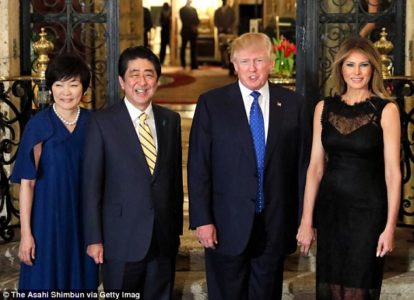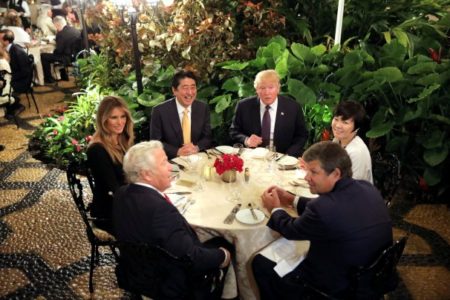
PALM BEACH, Fla. — President Trump welcomed Chinese President Xi Jinping here Thursday at his Mar-a-Lago estate, kicking off a two-day summit that U.S. Secretary of State Rex Tillerson said would include “very frank discussions” over North Korea and trade.
Speaking to reporters after greeting Xi at the airport, Tillerson said the U.S. side would press the Chinese delegation to “find ways to exercise influence on North Korea’s actions to dismantle their nuclear weapons and their missile technology program.”
“China can be part of a new strategy to end North Korea’s reckless behavior and ensure security, stability and economic prosperity in Northeast Asia,” Tillerson added.
Trump, accompanied by first lady Melania Trump, greeted Xi with a handshake as the Chinese leader and his wife, Peng Liyuan, arrived at the resort for a series of bilateral talks, and a fancy opening night dinner with Trump and his top aides.
Trump arrived aboard Air Force One shortly after Xi. While flying, Trump told reporters on the plane that he believes “China will be stepping up” to deal more firmly with Pyongyang.
On trade, Trump reiterated his long-standing grievance over a large U.S. trade deficit to China.
“We have been treated unfairly and have made terrible trade deals with China for many, many years,” he said. “That’s one of the things we are going to be talking about.”
The unorthodox location of the summit is intended to lessen the formality of the first meeting between the two leaders, White House aides said, and help establish a working relationship, if not rapport, between Trump and Xi after moments of tension during the U.S. election season.
Xi will spend just over 24 hours here, including a working lunch on Friday, officials said. Xi and the Chinese delegation will not stay overnight at the resort but rather at a nearby hotel.
The trappings of the president’s personal property will not mask the seriousness and urgency of the long list of topics that will be discussed.
Trump has offered conflicting signals about his state of mind heading into the summit. He told business leaders in Washington this week that he had a “lot of respect” for Xi, but last week on Twitter he predicted the meeting would be a “very difficult one” because of the U.S. trade deficit with China.
In an interview with the Financial Times last weekend, Trump said he would exhort Xi to put more pressure on Pyongyang to halt its nuclear and ballistic missile testing, which has violated U.N. Security Council resolutions. But he added that if Beijing failed to act, the United States would consider unilateral responses.

An administration official told reporters on Tuesday that the “clock is very, very quickly running out” and all options are on the table, though the White House has declined to be specific. Hours later, North Korea executed another ballistic missile test that prompted a curt response from Tillerson, who said in a statement that the United States had spoken enough about North Korea and would have no further comment about its provocations.
“It’s an urgent and global threat, and we see the North Korean weapons programs as increasingly destabilizing, both for Northeast Asia and for the globe,” Susan Thornton, the acting assistant secretary of state for East Asian and Pacific Affairs, told reporters Wednesday.
Among the administration’s options, experts said, are sanctions on Chinese banks that do business with Pyongyang in a bid to restrict the flow of capital to North Korean dictator Kim Jong Un’s regime.
“It’s certainly going to come up,” said a senior administration official, who briefed reporters on the condition of anonymity to preview the discussions. “Ninety percent of North Korea’s external trade is with China. Even though we heard that China’s political influence may have diminished with North Korea, certainly its economic leverage has not. It is considerable.”
On trade, Trump elevated grievances over China’s trade surplus to a centerpiece of his campaign, accusing Beijing repeatedly of devaluing its currency, even though economists have said the country has in recent years artificially inflated its value.
As a candidate, Trump threatened to slap large tariffs on Chinese goods, though he has tempered such rhetoric since taking office, as more moderate views of his chief economic adviser Gary Cohn and senior adviser Jared Kushner, Trump’s son-in-law, have balanced the harder-line nationalist views of senior adviser Stephen K. Bannon and Peter Navarro, director of the National Trade Council.
At their dinner, Trump joked that Xi had yet to make any concessions in their early talks, but he added that the two “have developed a friendship.” Several hours later, Chinese state media reported that Trump had accepted Xi’s invitation to visit China, though no time or place was announced.
Some U.S. foreign policy analysts cautioned that the summit is premature, given that Trump has yet to fill hundreds of higher-level staff positions at government agencies, including the Pentagon and State Department, and the administration’s China policy has not yet been clearly developed.
The more informal setting at Mar-a-Lago also represents a risk, some analysts said. Trump entertained Japanese Prime Minister Shinzo Abe at his estate in February, but only after the leaders of the two allied nations had first met at the White House. They then flew to Mar-a-Lago and played 27 holes of golf at two nearby Trump-branded golf courses.
Unlike Abe, Xi did not stop at the White House, nor will he and Trump hit the links. Xi banned party leaders from playing golf and shut down scores of courses in China in a crackdown on corruption.
In 2013, President Barack Obama invited Xi to Sunnylands, a lush estate in Southern California, for a first summit in an attempt to break the ice. The meeting had mixed success, helping lead to later breakthroughs on climate efforts and a reduction of Chinese cybertheft against U.S. businesses. In other areas, however, including maritime security and human rights, relations between Obama and Xi soured.
“Our presidents should stop trying to use a personal touch with Chinese leaders. It doesn’t work,” said Michael Auslin, an Asia expert at the conservative American Enterprise Institute. “They have their interests, we have our interests. A D.C. meeting shows we can focus on interests, which is what the Chinese expect. Sunnylands was a failure by every measure. This has the same potential.”
Source: The Washington Post
